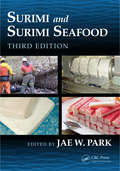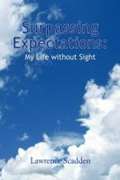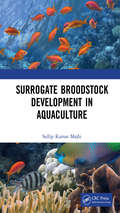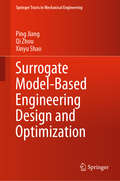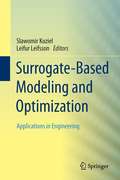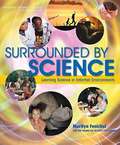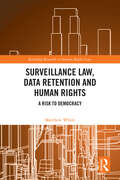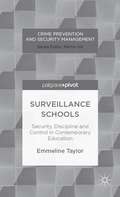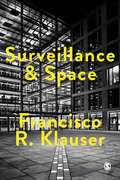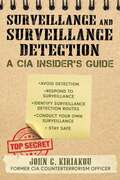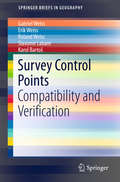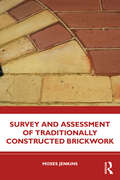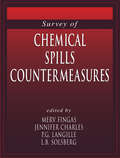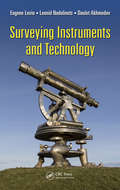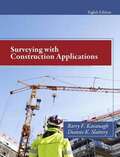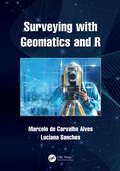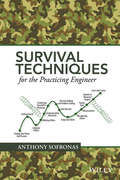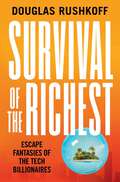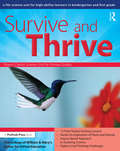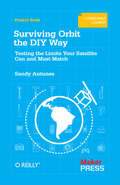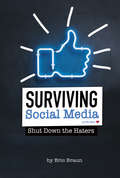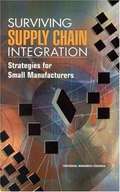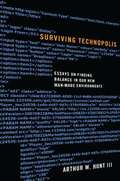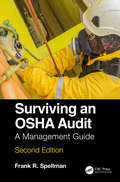- Table View
- List View
Surimi and Surimi Seafood
by Jae W. ParkOriginating in Japan in the twelfth century, surimi is refined fish myofibrillar proteins produced through various processes. The development of the surimi product crabstick in Japan in the 1970s played a major role in globalizing surimi and expanding surimi seafood consumption to the United States, Europe, and Russia. Commercial surimi production
Surpassing Expectations: My Life without Sight
by Lawrence ScaddenThe booktells the story of the author's life without sight,a memoir that recalls the activities that brought him international acclaim as a scientist, policymaker, and advocate.
Surrogate Broodstock Development in Aquaculture
by Sullip Kumar MajhiThe rapidly changing climatic condition coupled with habitat destruction, aquatic pollution and increasing anthropogenic pressure on water bodies have resulted in decline of many important fish population and some of them even become endangered. As of now the breeding protocol for seed production in captivity is developed for only handful of fish species and mostly their seed is collected from natural resources for aquaculture. This factor limits the efforts for species diversification in aquaculture. There are approaches/ technologies to generate seed of such fish species for aquaculture, especially the species that are too large to propagate in captivity or species those do not response to hormonal treatments due to stress of confinement. One of the viable approach is surrogate broodstock development using adult fish as the recipient. The obvious advantage of using adult fish as recipient is that, the donor-derived gametes can be generated within few months after stem cell transplantation; oppose to using embryos or young hatchlings those take years together to attain sexual maturity. Note: T& F does not sell or distribute the Hardback in India, Pakistan, Nepal, Bhutan, Bangladesh and Sri Lanka.
Surrogate Model-Based Engineering Design and Optimization (Springer Tracts in Mechanical Engineering)
by Qi Zhou Ping Jiang Xinyu ShaoThis book covers some of the most popular methods in design space sampling, ensembling surrogate models, multi-fidelity surrogate model construction, surrogate model selection and validation, surrogate-based robust design optimization, and surrogate-based evolutionary optimization.Surrogate or metamodels are now frequently used in complex engineering product design to replace expensive simulations or physical experiments. They are constructed from available input parameter values and the corresponding output performance or quantities of interest (QOIs) to provide predictions based on the fitted or interpolated mathematical relationships.The book highlights a range of methods for ensembling surrogate and multi-fidelity models, which offer a good balance between surrogate modeling accuracy and building cost. A number of real-world engineering design problems, such as three-dimensional aircraft design, are also provided to illustrate the ability of surrogates for supporting complex engineering design. Lastly, illustrative examples are included throughout to help explain the approaches in a more “hands-on” manner.
Surrogate-Based Modeling and Optimization
by Leifur Leifsson Slawomir KozielContemporary engineering design is heavily based on computer simulations. Accurate, high-fidelity simulations are used not only for design verification but, even more importantly, to adjust parameters of the system to have it meet given performance requirements. Unfortunately, accurate simulations are often computationally very expensive with evaluation times as long as hours or even days per design, making design automation using conventional methods impractical. These and other problems can be alleviated by the development and employment of so-called surrogates that reliably represent the expensive, simulation-based model of the system or device of interest but they are much more reasonable and analytically tractable. This volume features surrogate-based modeling and optimization techniques, and their applications for solving difficult and computationally expensive engineering design problems. It begins by presenting the basic concepts and formulations of the surrogate-based modeling and optimization paradigm and then discusses relevant modeling techniques, optimization algorithms and design procedures, as well as state-of-the-art developments. The chapters are self-contained with basic concepts and formulations along with applications and examples. The book will be useful to researchers in engineering and mathematics, in particular those who employ computationally heavy simulations in their design work.
Surrounded by Science: Learning Science in Informal Environments
by National Research Council of the National AcademiesPractitioners in informal science settings--museums, after-school programs, science and technology centers, media enterprises, libraries, aquariums, zoos, and botanical gardens--are interested in finding out what learning looks like, how to measure it, and what they can do to ensure that people of all ages, from different backgrounds and cultures, have a positive learning experience. Surrounded by Science: Learning Science in Informal Environments, is designed to make that task easier. Based on the National Research Council study, Learning Science in Informal Environments: People, Places, and Pursuits, this book is a tool that provides case studies, illustrative examples, and probing questions for practitioners. In short, this book makes valuable research accessible to those working in informal science: educators, museum professionals, university faculty, youth leaders, media specialists, publishers, broadcast journalists, and many others.
Surveillance Law, Data Retention and Human Rights: A Risk to Democracy (Routledge Research in Human Rights Law)
by Matthew WhiteThis book analyses the compatibility of data retention in the UK with the European Convention on Human Rights (ECHR). The increase in the use of modern technology has led to an explosion of generated data and, with that, a greater interest from law enforcement and intelligence agencies. In the early 2000s, data retention laws were introduced into the UK, and across the European Union (EU). This was met by domestic challenges before national courts, until a seminal ruling by the Court of Justice in the European Union (CJEU) ruled that indiscriminate data retention was incompatible with EU law. Since then, however, the CJEU has revised its position and made certain concessions, particularly under the guise of national security. This book focuses on data retention in the UK with the principal aim of examining compatibility with the ECHR. This is explored through a variety of ways including providing an account of democracy and why secret surveillance poses a threat to it, a history of data retention, assessing the seriousness that data retention poses to fundamental rights, the collection of rights that are affected by data retention which are crucial for a functioning democracy, the implications of who can be obligated to retain (and what to retain), the idea that data retention is a form of surveillance and ultimately, with all things considered, whether this is compatible with the ECHR. The work will be an invaluable resource for students, academics, researchers and policy-makers working in the areas of privacy, human rights law and surveillance.
Surveillance Schools: Security, Discipline and Control in Contemporary Education
by Emmeline TaylorFocusing on the phenomena of the Surveillance School, Taylor examines the increased presence of surveillance technologies and practices which identify, verify, categorise and track pupils, exploring the impact that invasive and continual monitoring is having upon school children.
Surveillance and Space (Society and Space)
by Francisco KlauserThe digital age is also a surveillance age. Today, computerized systems protect and manage our everyday life; the increasing number of surveillance cameras in public places, the computerized loyalty systems of the retail sector, geo-localized smart-phone applications, or smart traffic and navigation systems. Surveillance is nothing fundamentally new, and yet more and more questions are being asked: Who monitors whom, and how and why? How do surveillance techniques affect socio-spatial practices and relationships? How do they shape the fabrics of our cities, our mobilities, the spaces of the everyday? And what are the implications in terms of border control and the exercise of political power? Surveillance and Space responds to these modern questions by exploring the complex and varied interactions between surveillance and space. In doing so, the book also advances a programmatic reflection on the very possibility of a ‘political geography of surveillance’.
Surveillance and Surveillance Detection: A CIA Insider's Guide
by John KiriakouHave you ever thought you were being followed or watched? Have you ever needed to follow or observe someone and not be seen?In the world of espionage, surveillance and surveillance detection are a way of life. It is the job of every CIA operations officer to make sure he or she is not under surveillance—that is, being followed to the commission of an &“operational act.&” It is also the job of every CIA operations officer to surveil his own targets, whether they are terrorists or terrorist suspects, foreign intelligence officers, hostile actors, or even sometimes his own agents for vetting purposes. In everyday life, many people from all walks of life need to know how to perform similar operations. Whether avoiding a stalker, checking up on an unfaithful partner, or just securing one&’s own privacy, a working knowledge of modern surveillance and surveillance detection techniques is a critical skill to possess. And there is nobody better to teach that skill than someone trained by the CIA.From former CIA counterterrorism officer John C. Kiriakou, Surveillance and Surveillance Detection: A CIA Insider's Guide takes you through the CIA's surveillance and surveillance detection program. It will teach you to apply CIA surveillance techniques to your own everyday life. You&’ll learn how to stay safe, to ensure your privacy, and to keep the honest people honest—the CIA way.
Survey Control Points
by Gabriel Weiss Erik Weiss Roland Weiss Slavomír Labant Karol BartošThis work deals with the issue of geodetic network structures, i. e. methods of verifying the condition of existing geodetic controls in terms of their compatibility and thereby their applicability. The presented work addresses these problems only for geodetic controls on a local scale. This is a common surveying issue in a number of countries, especially where there are concerns about the quality of the structure and homogeneity of national spatial and triangulation networks. There is a need for verification, not only for the use of terrestrial methods of determination of points but also for other surveying technology, since all technology operates with a certain threshold accuracy and using physical marks located on an unstable earth surface as survey control points. Issues of the compatibility of points whose coordinates are defined as functions of time by specific equations with respect to basal positions of points at certain epochs (points in systems ITRS, ETRS and others) are not considered.
Survey and Assessment of Traditionally Constructed Brickwork
by Moses JenkinsThe principal aim of this book is to improve the practice of surveying traditionally constructed brickwork. It aims to ensure that those who have a cause to survey buildings constructed of traditional (pre-1919) brickwork have a well-developed, clear methodology for undertaking effective, comprehensive surveys. The book will help readers gain the proper level of knowledge, expertise and skill to be able to survey these buildings correctly; to recognise not just defects within the brickwork itself, but also, crucially, the cause of these defects. Experienced author Moses Jenkins presents a clear and concise methodology for the survey of brickwork in existing buildings with coverage including: identifying repair needs understanding the cause of decay within brickwork ascertaining the age and significance of traditionally constructed brickwork, and identifying significant technical and decorative features. Despite the extensive use of traditionally constructed brick worldwide, the knowledge and expertise to properly survey buildings of this type has not, to date, been laid out in a reliable and methodical way. This book addresses this deficiency and provides an invaluable resource to all those who survey and assess buildings constructed of brickwork. This includes building professionals such as architects, surveyors, engineers and those working in building conservation, but also construction managers and students studying built environment disciplines.
Survey of Chemical Spill Countermeasures
by Merv Fingas Jennifer Charles P. G. Langille L. B. SolsbergUntil now, information regarding chemical spill clean-up was available only through manufacturer's literature from an individual firm, or scattered in the traditional textbooks on remediation engineering and hazardous waste management. Survey of Chemical Spill Countermeasures provides a one-stop source of information on how to clean up spill sites in safe, acceptable ways. Because of the ever-growing need to maintain constant vigilance over hazardous chemicals and potential leaks and spills, this reference will become an important source for the practicing environmental engineer and field technician.Survey of Chemical Spill Countermeasures provides operators with useful information on how to clean up sites, including controlling leakage, containment of spills on land and water, and ways to safely transfer and store the contaminants. Additionally, the book includes up-to-date information on containment and treatment technologies, from dredging and vacuuming, to solid and vapor treatment systems.
Surveying Instruments and Technology
by Eugene Levin Daulet Akhmedov Leonid NadolinetsWith the advent of GPS/GNSS satellite navigation systems and Unmanned Aerial Systems (UAS) surveying profession is nowadays facing its transformative stage. Written by a team of surveying experts, Surveyor’s Instruments and Technology gives surveying students and practitioners profound understanding of how surveying instruments are designed and operating based on surveying instrument functionality. The book includes the required basic knowledge of accurate measurements of distances and angles from theoretical principles to advanced optical, mechanical, electronic and software components for comparative analysis. Readers are presented with basic elements of UAS systems, practical interpretation techniques, sensor components, and operating platforms. Appropriate for surveying courses at all levels, this guide helps students and practitioners alike to understand what is behind the buttons of surveying instruments of all kinds when considering practical project implementations.
Surveying with Construction Applications
by Barry F. Kavanagh Dianne K. SlatteryTeaching and Learning Experience This book will help surveyors master all the modern skills, techniques, and technologies they need to work effectively with construction professionals and engineers: Thoroughly presents all the general surveying principles and techniques students need: Begins with eleven chapters walking through surveying fundamentals, distance measurement, computations, satellite positioning, geomatics, and much more -- including a brand-new math review chapter for students with limited math background Links principles and techniques to contemporary applications in the construction of most civil projects: Addresses a wide range of surveying applications, from highways and streets to pipelines, tunnels, bridges, culverts, and buildings Provides extensive hands-on practice, strong pedagogy, and valuable professional reference resources: Includes updated laboratory exercises, efficient features for review, useful reference appendices, up-to-date web links, and more
Surveying with Geomatics and R
by Marcelo de Carvalho Alves Luciana SanchesSurveying with Geomatics and RThis book explains basic concepts of surveying science and techniques with geomatics using R software and R packages. It engages students in learning about surveying through real field examples and using differing degrees of complexity while exploring surveying problems based on field observations and advanced geospatial technology. It includes a wide range of case studies as hands-on and self-paced tutorials along with detailed computer programming routines that are linked to the theories and applications explained in each chapter. This innovative textbook also teaches how to explore other possibilities of using geomatics in geocomputation, remote sensing, geography and cartography courses focused on surveying tasks.Features include: Provides modern surveying practices with free software algorithm and R toolset for active learning Includes case studies from different geographical areas using arbitrary and international cartographic reference systems Enables and demonstrates the integration of traditional geomatics with modern geospatial big data technologies Explains data standards, equipment used, possible analyses and the importance of error evaluation for scientific surveying Discusses different scales of landscapes and brings together the experiences of leading experts in the field
Survival Techniques For The Practicing Engineer
by Anthony SofronasProviding engineers with the tools and skills to survive and become successful in the work place Gives experience-based, highly realistic guidance to a cross-section of young and even established engineers Delivers practical guidance and acts as a handy resource so that lessons do not have to be learned the hard way with numerous errors, and costly problems Includes real world examples and case studies from a 45 year veteran in the engineering field
Survival of the Richest: Escape Fantasies of the Tech Billionaires
by Douglas RushkoffThe tech elite have a plan to survive the apocalypse: they want to leave us all behind. Five mysterious billionaires summoned Douglas Rushkoff to a desert resort for a private talk. The topic? How to survive The Event: the societal catastrophe they know is coming. Rushkoff came to understand that these men were under the influence of The Mindset, a Silicon Valley–style certainty that they can break the laws of physics, economics, and morality to escape a disaster of their own making—as long as they have enough money and the right technology. In Survival of the Richest, Rushkoff traces the origins of The Mindset in science and technology through its current expression in missions to Mars, island bunkers, and the Metaverse. This mind-blowing work of social analysis shows us how to transcend the landscape The Mindset created—a world alive with algorithms and intelligences actively rewarding our most selfish tendencies—and rediscover community, mutual aid, and human interdependency. Instead of changing the people, he argues, we can change the program.
Survive and Thrive: A Life Science Unit for High-Ability Learners in Grades K-1
by College of William & Mary's Centre for Gifted ChildrenSurvive and Thrive, a life science unit for grades K-1, provides students an opportunity to study animals, their characteristics, and their natural environments. The overarching concept of change guides students as they use webcams to distinguish the features of animals, determine their basic needs to survive, and observe animals in their habitats.Survive and Thrive was developed by the Center for Gifted Education at The College of William and Mary to offer advanced curriculum supported by years of research. The Center's materials have received national recognition from the United States Department of Education and the National Association for Gifted Children, and they are widely used both nationally and internationally.Each of the books in this series offers curriculum that focuses on advanced content and higher level processes. The science units contain simulations of real-world problems, and students experience the work of real science by using data-handling skills, analyzing information, and evaluating results. The mathematics units provide sophisticated ideas and concepts, challenging extensions, higher order thinking skills, and opportunities for student exploration based on interest. These materials are a must for any teacher seeking to challenge and engage learners and increase achievement.Grades K-1
Surviving Orbit the DIY Way: Testing the Limits Your Satellite Can and Must Match
by Sandy AntunesIs your picosatellite ready for launch? Can it withstand rocket thrusts and the vacuum of space? This do-it-yourself guide helps you conduct a series of hands-on tests designed to check your satellite’s readiness. Learn precisely what the craft and its electronic components must endure if they’re to function properly in Low Earth Orbit.The perfect follow-up to DIY Satellite Platforms (our primer for designing and building a picosatellite), this book also provides an overview of what space is like and how orbits work, enabling you to set up the launch and orbit support you’ll need.Go deep into the numbers that describe conditions your satellite will faceLearn how to mitigate the risks of radiation in the ionospherePick up enough formal systems engineering to understand what the tests are all aboutBuild a thermal vacuum chamber for mimicking environment of spaceSimulate the rocket launch by building and running a vibration shake testUse a homebuilt centrifuge to conduct high G-force testsGet guidelines on scheduling tests and choosing an appropriate lab or clean room
Surviving Social Media: Shut Down the Haters (Informed!)
by Eric BraunNearly 75 percent of the U.S. population uses social media. For students, it is often considered a lifeline to connecting with their peers and staying relevant. But there's a dark side as well. How much social media use is healthy? What happens when trolls take over? Where do you go for help? Readers will learn to understand the pros and cons of social media and how to make smart decisions about managing their online presence.
Surviving Supply Chain Integration: Strategies for Small Manufacturers
by National Research CouncilThe managed flow of goods and information from raw material to final sale also known as a "supply chain" affects everything--from the U.S. gross domestic product to where you can buy your jeans. The nature of a company's supply chain has a significant effect on its success or failure--as in the success of Dell Computer's make-to-order system and the failure of General Motor's vertical integration during the 1998 United Auto Workers strike.Supply Chain Integration looks at this crucial component of business at a time when product design, manufacture, and delivery are changing radically and globally. This book explores the benefits of continuously improving the relationship between the firm, its suppliers, and its customers to ensure the highest added value.This book identifies the state-of-the-art developments that contribute to the success of vertical tiers of suppliers and relates these developments to the capabilities that small and medium-sized manufacturers must have to be viable participants in this system. Strategies for attaining these capabilities through manufacturing extension centers and other technical assistance providers at the national, state, and local level are suggested.This book identifies action steps for small and medium-sized manufacturers--the "seed corn" of business start-up and development--to improve supply chain management. The book examines supply chain models from consultant firms, universities, manufacturers, and associations. Topics include the roles of suppliers and other supply chain participants, the rise of outsourcing, the importance of information management, the natural tension between buyer and seller, sources of assistance to small and medium-sized firms, and a host of other issues.Supply Chain Integration will be of interest to industry policymakers, economists, researchers, business leaders, and forward-thinking executives.
Surviving Technopolis: Essays on Finding Balance in Our New Man-Made Environments
by Arthur W. Hunt IIIThese essays not only evaluate Technopolis, but also seek wisdom to cope with our new human-made environments. Positively stated, they offer suggestions on how to bring us back into balance. Some of our best wisdom in analyzing Technopolis can be found in the voices of the Christian humanists. Unlike Enlightenment humanism, which tends to be human-centered, Christian humanism is concerned with the role of humankind within God's created order.
Surviving an OSHA Audit: A Management Guide
by Frank R. SpellmanHailed on its first publication as a masterly account detailing a roadmap for compliance with workplace standards, regulations, and rules, Surviving an OSHA Audit: A Management Guide, Second Edition, is specifically designed for managers and other professionals who seek to provide a safe work environment. It also serves as a helpful reference for those who want to keep OSHA from repeatedly knocking on the door and issuing citations that can be both embarrassing and expensive. Completely revised and updated with eight important chapters added, emphasis is placed on compliance through vigilance and proper work practices. With compliance in mind, it is important to recognize that OSHA regulations, standards, or rulings are not static; they continue to be revised over time. This new edition highlights those areas of regulation that have changed as well as those that are still current and relevant. Features: Fully updated to reflect the most up-to-date changes in regulation. Presents numerous practical examples throughout. Examines the importance of and best practices for recordkeeping protocols. This book is an excellent resource and guide relevant to a broad audience, including academia, legal professionals, workplace managers, safety professionals, students, and administrators at all levels.
